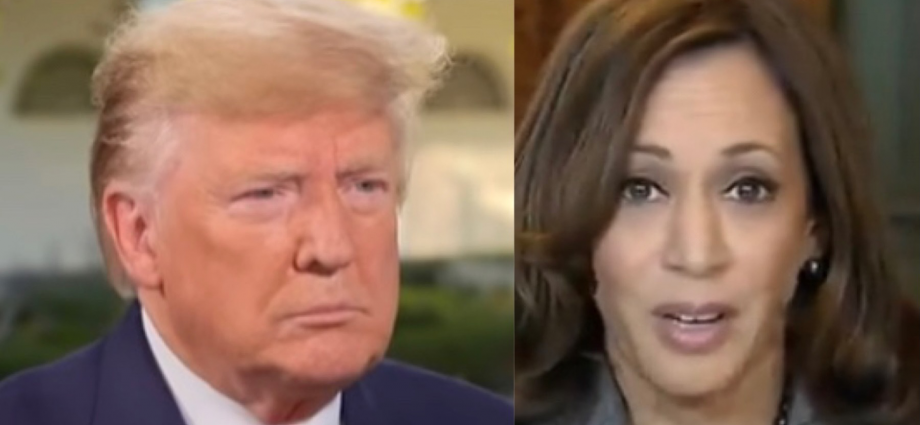In an interview this morning on ABC’s “Good Morning America,” Vice President Kamala Harris again attempted to shift blame from the current administration for the border crisis.
Harris claimed in the interview that the Biden administration “Inherited an immigration system that is deeply broken” from former President Donald Trump
In a clip shared in a tweet by The Recount, Harris can be seen apparently responding to a question by George Stephanopolous about the border crisis.
“It’s not going to be overnight and we can’t just flip a switch and make it better. The reality is that we inherited an immigration system that was deeply broken,” Harris insisted.
Harris then revealed the administration’s true intentions as she explained, “It’s requiring us to actually put it back together in terms of creating a fair process that is effective and efficient, but on the root causes piece, what we are looking at is that frankly, people don’t want to leave home George.”
The Hill’s Joe Concha quote tweeted the tweet from The Recount and said, “Harris blames Trump for illegal migrant crossings at a 20-year high, with numbers approaching 2M crossings since the beginning of the year.”
“If looking for why Biden-Harris is polling in the 20s on the issue, perhaps it’s because of zero inclination to fix it while passing blame,” Concha added.
Harris blames Trump for illegal migrant crossings at a 20-year high, with numbers approaching 2M crossings since the beginning of the year.
— Joe Concha (@JoeConchaTV) November 18, 2021
If looking for why Biden-Harris is polling in the 20s on the issue, perhaps it's because of zero inclination to fix it while passing blame https://t.co/jZv4DoQRQC
This isn’t the first time that Harris has attempted to blame the Trump administration for the issue. In July, we reported:
With illegal immigration at an all-time high, border czar Vice President Kamala Harris has released an 18-page report with a “Strategy for addressing the root causes.”
In the “cover message,” Harris blames the Trump administration for the recent surge in illegal immigration after explaining that she believes “In Central America, the root causes of migration run deep—and migration from the region has a direct impact on the United States. For that reason, our nation must consistently engage with the region to address the hardships that cause people to leave Central America and come to our border.”
“For decades, our nation has engaged in Central America. Often well intentioned, the engagement has often not been consistent. And over the last few years, the United States significantly pulled back from work in the region,” the message states.
The report offers four short term solutions that the administration insists will be effective in stemming the flow of illegal immigration.
“We will build a coalition of people, organizations, and businesses committed to creating economic opportunity and fostering political will for structural reforms in Guatemala, El Salvador, and Honduras,” the report states.
The Biden administration believes that if they “work with the private sector to mobilize investment in the region to create economic opportunity” that will also help stem the tide.
“We will address humanitarian needs from the fall 2020 hurricanes, provide training and finance to jump start the economies after COVID-19 and hurricane devastation, and provide critical support to those in need of food assistance. We will focus on education and training for youth,” the report continues.
In an apparent attempt to influence the future of the region’s politics, the Biden Administration also intends to “Ensure people in the region know about the United States’ commitment to supporting good governance, economic opportunities, and security so they understand help is on the way to build hope for a better future at home. We will communicate clearly to governments in the region that the United States wants to be a partner in their success, but that this partnership requires a shared commitment to inclusive and transparent democratic governance.”
The report also offers medium-term solutions such as promoting “reform,” creating “economic opportunity,” fighting “corruption, combatting “insecurity,” as well as addressing “climate change” and improving “disaster preparedness.”
In the long-term, the report states, the administration really hopes to influence the political and economic future of the region.
- Tim Kaine Provides Cover For Joe Biden on the Border Crisis, Blames Lack of a ‘Robust Work Visa Program’ for ‘Some of the Chaos at the Border’ - March 27, 2024
- Elon Musk Rips NBC For Hiring and ‘Immediately’ Firing Ronna McDaniel ‘That’s How Biased They Are!’ - March 27, 2024
- Marjorie Taylor Greene Makes Move, Files Motion to Vacate Against Speaker Mike Johnson After House Passage of $1.2T Spending Bill - March 22, 2024

